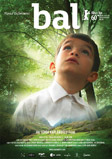25/03/2011
Yana Litovsky / Film-Forward
BAL (HONEY)
The plot of Bal (Honey) is simple and incidental: the straightforward story of a young boy’s all encompassing love for his father and his weariness of everyone else. Set in the impossibly lush mountains along the Black Sea coast of northeast Turkey, it could have been a nature film, made only to capture the stunning mist-bathed surroundings. But perhaps it’s a tribute to Yusuf (Bora Altas), the seven-year-old protagonist with the unnerving presence of a pensive cub.
Yusuf doesn’t utter a word to his mother (Tulin Ozen), stutters when called upon in class, and regards everything around him with bemused silence. But his father (Erdal Besikcioglu)—a beekeeper who plants his hives high up in the soaring trees—wisely cajoles the boy to speak in whispers, and he responds in the same hushed tones. Their relationship pushes the two into a private space within their already isolated landscape. When his father doesn’t return from a trip into the woods, Yusuf and his mother go looking for him. If he isn’t found, Yusuf might lose his only connection to the world.
There’s an exaggerated childhood wonder in Yusuf’s slow and mindful motions. Though his stutter is involuntary and he desperately craves approval from his patient teacher, we get the sense that he chooses to seek only his father company—a decision about his priorities which feels oddly mature.
Bal revels in the beauty and sweetness of children and nature. Most scenes are beautiful but not particularly arresting, simply capitalizing on the natural landscape. Yet some are mesmerizing. A bright reflection of a full moon pocked with craters dances in a pitcher of black water. When Yusuf dips his head into the bucket, the moon disappears into the waves. Though the patent attempts at symbolism are a bit distracting, the scene is none the less beautiful for it.
In the company of so many Turkish films about religious or political strife, it’s intriguing to watch a movie like Bal, which resembles more of a fairytale and feels centuries away from the modern world. But while beautiful, it can feel long and, at times, even tedious. Perhaps it should be treated like a two-hour meditation for which a patient mood and disposition are absolutely critical. And like a meditation, the effects may only be palpable after the spell is broken and the movie ends.
|
|
|




